Branches and Binary Operators
BOA: Branches and Binary Operators
Next, lets add
- Branches (
if-expressions) - Binary Operators (
+,-, etc.)
In the process of doing so, we will learn about
- Intermediate Forms
- Normalization
Branches
Lets start first with branches (conditionals).
We will stick to our recipe of:
- Build intuition with examples,
- Model problem with types,
- Implement with type-transforming-functions,
- Validate with tests.
data Expr = ENum -- 12
| EPrim1 Op1 Expr -- add1(e)
| EVar Id -- x
| ELet Id Expr Expr -- let x = e1 in e2
| EIf Expr Expr ExprExamples
First, lets look at some examples of what we mean by branches.
- For now, lets treat
0as “false” and non-zero as “true”
Example: If1
- Since
10is not0we evaluate the “then” case to get22
Example: If2
- Since
sub(1)is0we evaluate the “else” case to get-1
QUIZ: If3
if-else is also an expression so we can nest them:
What should the following evaluate to?
- A.
999 - B.
0 - C.
1 - D.
1000 - E.
-1
Control Flow in Assembly
To compile branches, we will use:
- labels of the form
are “landmarks” from which execution (control-flow) can be started, or to which it can be diverted,
- comparisons of the form
- Perform a (numeric) comparison between the values
a1anda2, and Store the result in a special processor flag,
Jump operations of the form
jmp LABEL # jump unconditionally (i.e. always)
je LABEL # jump if previous comparison result was EQUAL
jne LABEL # jump if previous comparison result was NOT-EQUAL - Use the result of the flag set by the most recent
cmp - To continue execution from the given
LABEL
QUIZ
Which of the following is a valid x86 encoding of
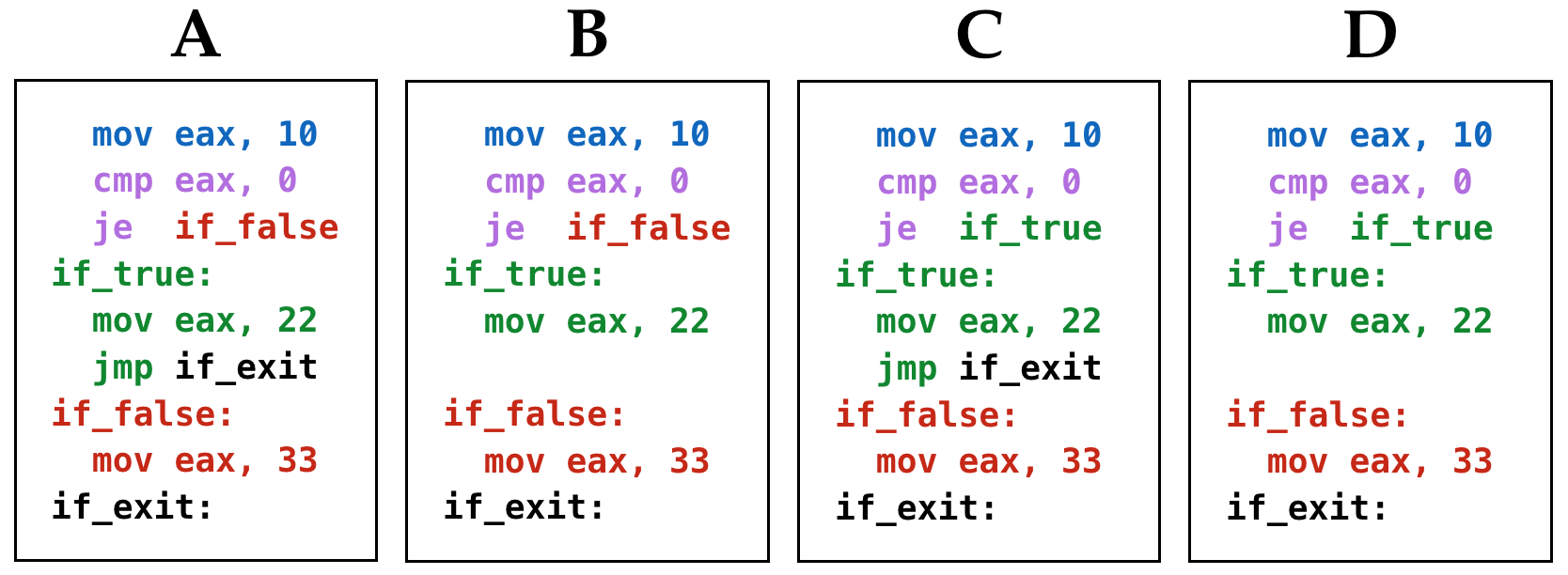
Strategy
To compile an expression of the form
We will:
- Compile
eCond - Compare the result (in
eax) against0 - Jump if the result is zero to a special
"IfFalse"label- At which we will evaluate
eElse, - Ending with a special
"IfExit"label.
- At which we will evaluate
- (Otherwise) continue to evaluate
eTrue- And then jump (unconditionally) to the
"IfExit"label.
- And then jump (unconditionally) to the
Example: If-Expressions to Asm
Lets see how our strategy works by example:
Example: if1
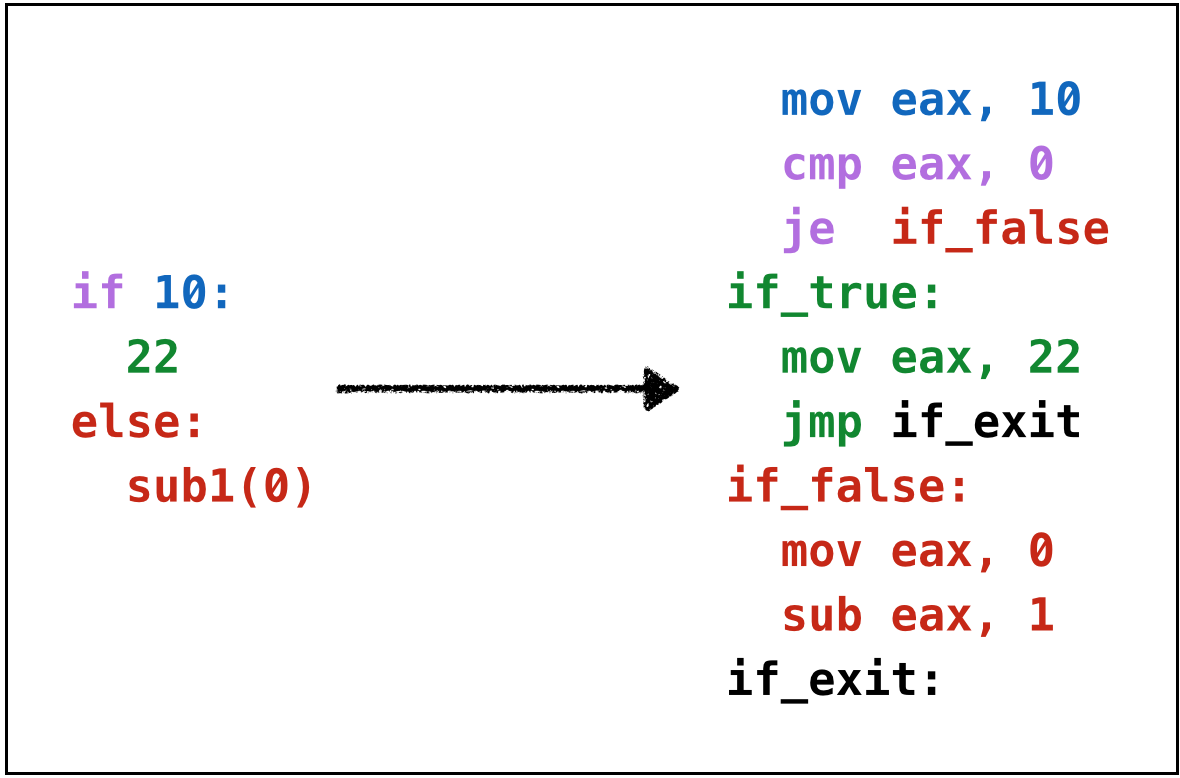
Example: if2
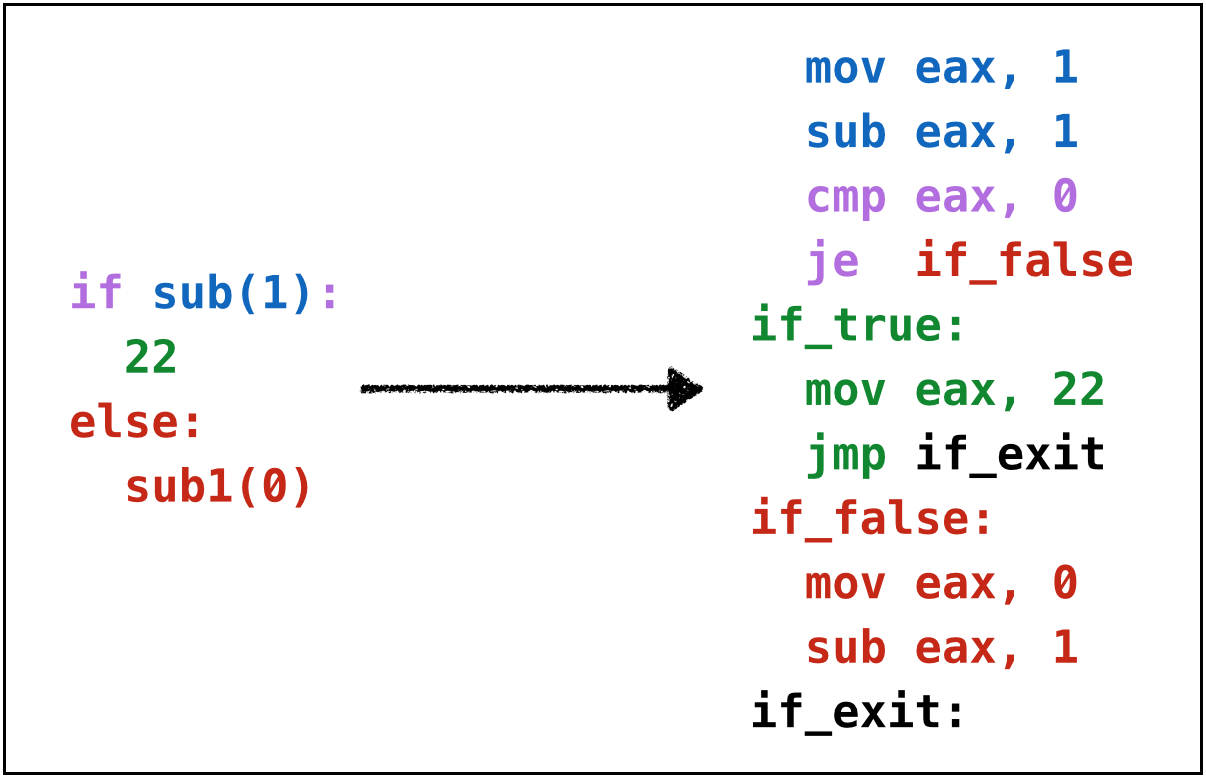
Example: if3
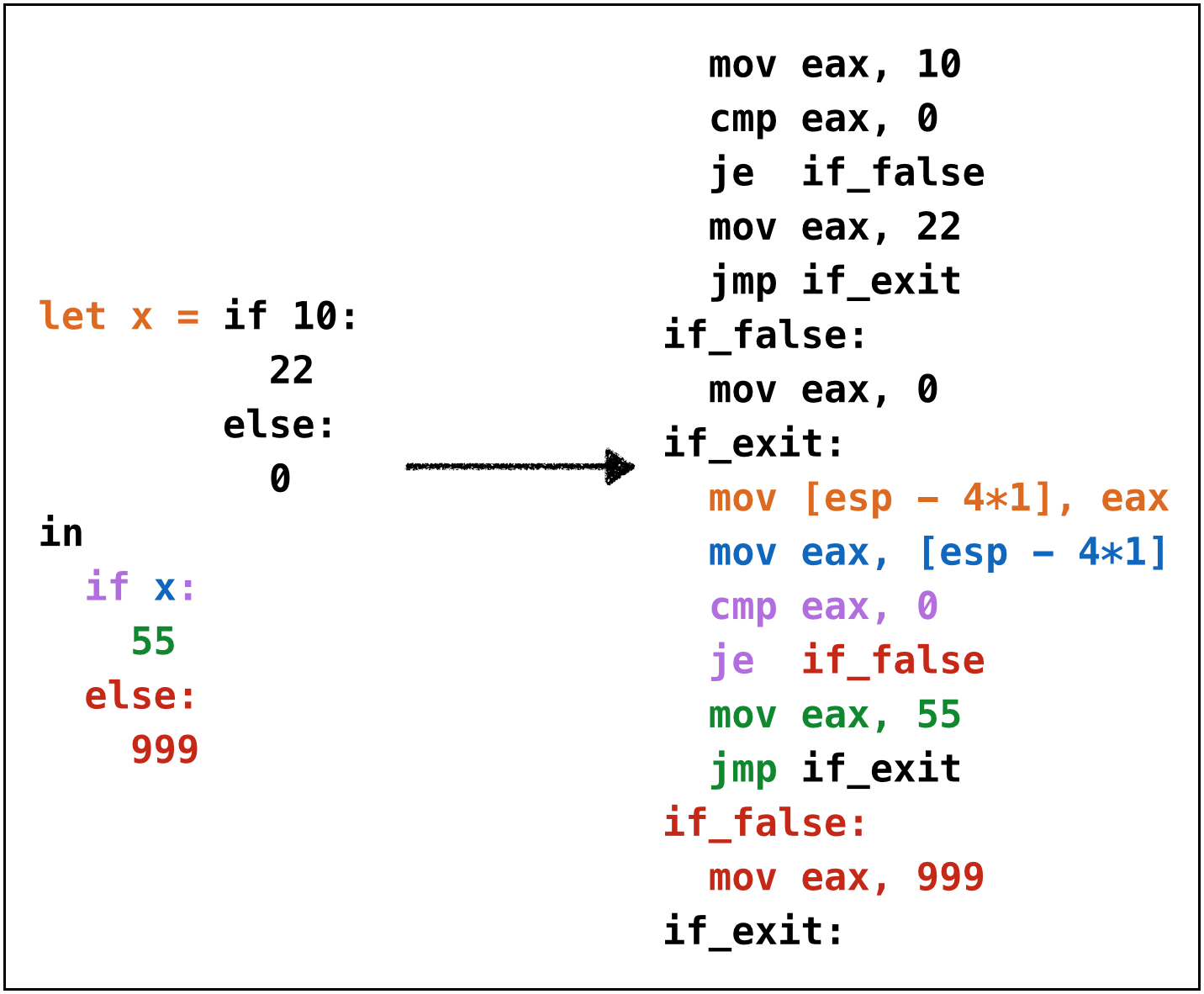
Oops, cannot reuse labels across if-expressions!
- Can’t use same label in two places (invalid assembly)
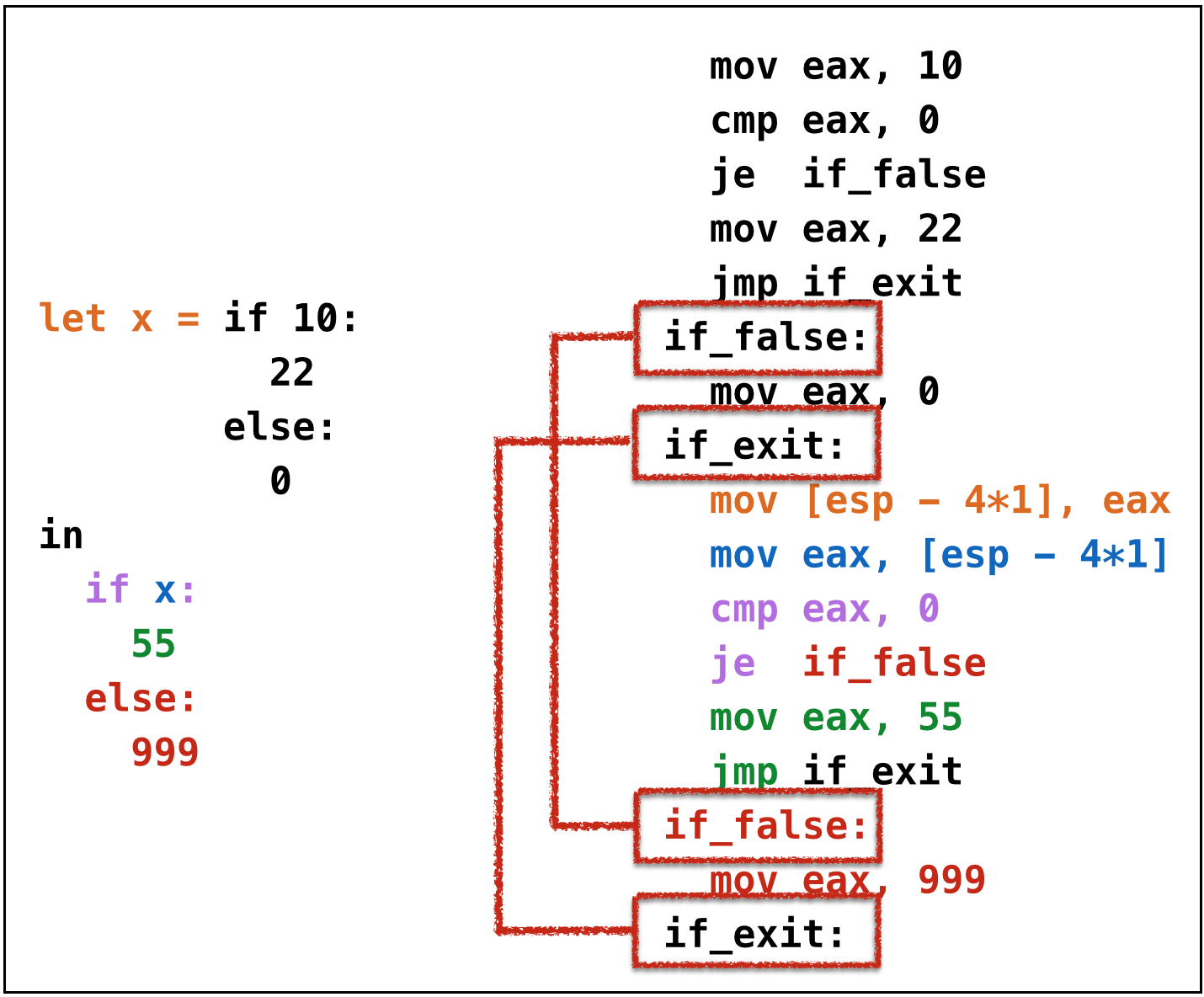
Oops, need distinct labels for each branch!
- Require distinct tags for each
if-elseexpression
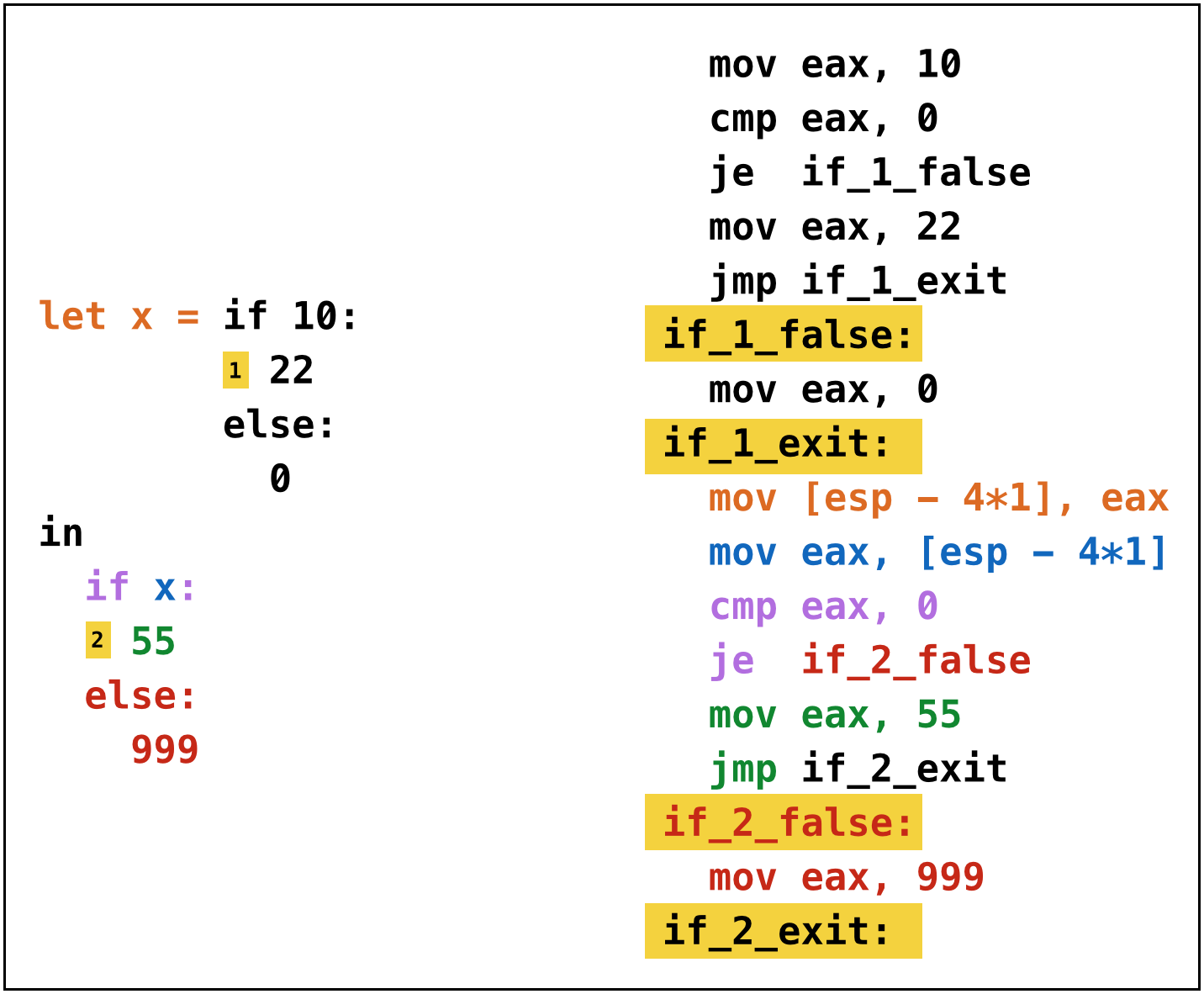
Types: Source
Lets modify the Source Expression
data Expr a
= Number Int a
| Add1 (Expr a) a
| Sub1 (Expr a) a
| Let Id (Expr a) (Expr a) a
| Var Id a
| If (Expr a) (Expr a) (Expr a) a- Add
if-elseexpressions and - Add tags of type
afor each sub-expression- Tags are polymorphic
aso we can have different types of tags - e.g. Source-Position information for error messages
- Tags are polymorphic
Lets define a name for Tag (just integers).
We will now use:
Types: Assembly
Now, lets extend the Assembly with labels, comparisons and jumps:
data Label
= BranchFalse Tag
| BranchExit Tag
data Instruction
= ...
| ICmp Arg Arg -- Compare two arguments
| ILabel Label -- Create a label
| IJmp Label -- Jump always
| IJe Label -- Jump if equal
| IJne Label -- Jump if not-equalTransforms
We can’t expect programmer to put in tags (yuck.)
- Lets squeeze in a
taggingtransform into our pipeline

Transforms: Parse
Just as before, but now puts a dummy () into each position
λ> let parseStr s = fmap (const ()) (parse "" s)
λ> let e = parseStr "if 1: 22 else: 33"
λ> e
If (Number 1 ()) (Number 22 ()) (Number 33 ()) ()
λ> label e
If (Number 1 ((),0)) (Number 22 ((),1)) (Number 33 ((),2)) ((),3)Transforms: Tag
The key work is done by doTag i e
- Recursively walk over the
BareEnamedestarting tagging at counteri - Return a pair
(i', e')of updated counteri'and tagged expre'
QUIZ
doTag :: Int -> BareE -> (Int, TagE)
doTag i (Number n _) = (i + 1 , Number n i)
doTag i (Var x _) = (i + 1 , Var x i)
doTag i (Let x e1 e2 _) = (_2 , Let x e1' e2' i2)
where
(i1, e1') = doTag i e1
(i2, e2') = doTag _1 e2What expressions shall we fill in for _1 and _2 ?
{- A -} _1 = i
_2 = i + 1
{- B -} _1 = i
_2 = i1 + 1
{- C -} _1 = i
_2 = i2 + 1
{- D -} _1 = i1
_2 = i2 + 1
{- E -} _1 = i2
_2 = i1 + 1(ProTip: Use mapAccumL)
We can now tag the whole program by
Calling
doTagwith the initial counter (e.g.0),Throwing away the final counter.
Transforms: CodeGen
Now that we have the tags we lets implement our compilation strategy
compile env (If eCond eTrue eFalse i)
= compile env eCond ++ -- compile `eCond`
[ ICmp (Reg EAX) (Const 0) -- compare result to 0
, IJe (BranchFalse i) -- if-zero then jump to 'False'-block
]
++ compile env eTrue ++ -- code for `True`-block
[ IJmp lExit ] -- jump to exit (don't execute `False`-block!)
++
ILabel (BranchFalse i) -- start of `False`-block
: compile env eFalse ++ -- code for `False`-block
[ ILabel (BranchExit i) ] -- exitRecap: Branches
Tageach sub-expression,- Use tag to generate control-flow labels implementing branch.
Lesson: Tagged program representation simplifies compilation…
- Next: another example of how intermediate representations help.
Binary Operations
You know the drill.
- Build intuition with examples,
- Model problem with types,
- Implement with type-transforming-functions,
- Validate with tests.
Compiling Binary Operations
Lets look at some expressions and figure out how they would get compiled.
- Recall: We want the result to be in
eaxafter the instructions finish.
QUIZ
What is the assembly corresponding to 33 - 10 ?
A.
?1 = sub,?2 = 33,?3 = mov,?4 = 10B.
?1 = mov,?2 = 33,?3 = sub,?4 = 10C.
?1 = sub,?2 = 10,?3 = mov,?4 = 33D.
?1 = mov,?2 = 10,?3 = sub,?4 = 33
How to compile n1 * n2
Example: Bin1
Lets start with some easy ones. The source:

Strategy: Given n1 + n2
- Move
n1intoeax, - Add
n2toeax.
Example: Bin2
let x = 10 -- position 1 on stack
, y = 20 -- position 2 on stack
, z = 30 -- position 3 on stack
in
x + (y * z)let x = 10 -- position 1 on stack
, y = 20 -- position 2 on stack
, z = 30 -- position 3 on stack
, tmp = y * z
in
x + tmpmov eax, 10
mov [ebp - 4*1], eax ; put x on stack
mov eax, 20
mov [ebp - 4*2], eax ; put y on stack
mov eax, 30
mov [ebp - 4*3], eax ; put z on stack
mov eax, [ebp - 4*2] ; grab y
mul eax, [ebp - 4*3] ; mul by z
mov [ebp - 4*4], eax ; put tmp on stack
mov eax, [ebp - 4*1] ; grab x
add eax, [ebp - 4*4]What if the first operand is a variable?

Simple, just copy the variable off the stack into eax
Strategy: Given x + n
- Move
x(from stack) intoeax, - Add
ntoeax.
Example: Bin3
Same thing works if the second operand is a variable.
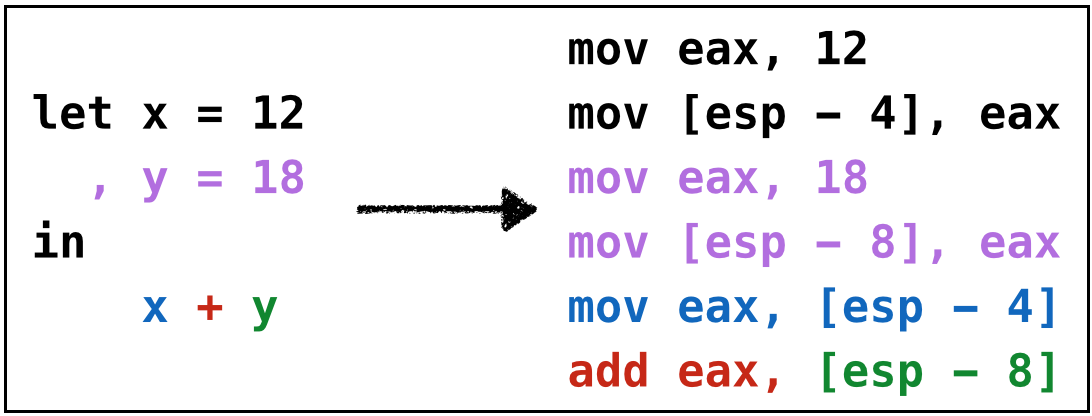
Strategy: Given x + n
- Move
x(from stack) intoeax, - Add
ntoeax.
QUIZ
What is the assembly corresponding to (10 + 20) * 30 ?
A.
?1 = add,?2 = 30,?3 = mul,?4 = 20B.
?1 = mul,?2 = 30,?3 = add,?4 = 20C.
?1 = add,?2 = 20,?3 = mul,?4 = 30D.
?1 = mul,?2 = 20,?3 = add,?4 = 30
Second Operand is Constant
In general, to compile e + n we can do
Example: Bin4
But what if we have nested expressions
- Can compile
1 + 2with result ineax… - .. but then need to reuse
eaxfor3 + 4
Need to save 1 + 2 somewhere!
Idea How about use another register for 3 + 4?
- But then what about
(1 + 2) * (3 + 4) * (5 + 6)? - In general, may need to save more sub-expressions than we have registers.
Idea: Immediate Expressions
Why were 1 + 2 and x + y so easy to compile but (1 + 2) * (3 + 4) not?
Because 1 and x are immediate expressions
Their values don’t require any computation!
- Either a constant, or,
- variable whose value is on the stack.
Idea: Administrative Normal Form (ANF)
An expression is in Administrative Normal Form (ANF)
if all primitive operations have immediate arguments.
Primitive Operations: Those whose values we need for computation to proceed.
v1 + v2v1 - v2v1 * v2
QUIZ
Is the following expression in ANF?
A. Yes, its ANF. B. Nope, its not, because of + C. Nope, its not, because of * D. Nope, its not, because of - E. Huh, WTF is ANF?
isImm :: Expr -> Bool
isImm (Number {}) = True
isImm (Id {}) = True
isImm _ = False
isANF :: Expr -> Bool
isANF (Number {}) = True
isANF (Id {}) = True
isANF (Prim1 _ e1 _) = isANF e1 -- no need to be `isImm e1`!
isANF (Prim2 _ e1 e2 _) = isImm e1 && isImm e2
isANF (Let _ e1 e2 _) = isANF e1 && isANF e2
isANF (If e1 e2 e3 _) = ??? && isANF e2 && isANF e3A. must be isImm B. meh ANF is fine!
Conversion to ANF
However, note the following variant is in ANF
How can we compile the above code?
Binary Operations: Strategy
We can convert any expression to ANF
- By adding “temporary” variables for sub-expressions

- Step 1: Compiling ANF into Assembly
- Step 2: Converting Expressions into ANF
Types: Source
Lets add binary primitive operators
and use them to extend the source language:
So, for example, 2 + 3 would be parsed as:
Types: Assembly
Need to add X86 instructions for primitive arithmetic:
Types: ANF
We can define a separate type for ANF (try it!)
… but …
super tedious as it requires duplicating a bunch of code.
Instead, lets write a function that describes immediate expressions
We can now think of immediate expressions as:
The subset of
Exprsuch thatisImmreturnsTrue
QUIZ
Similarly, lets write a function that describes ANF expressions
isAnf :: Expr a -> Bool
isAnf (Number _ _) = True
isAnf (Var _ _) = True
isAnf (Prim2 _ e1 e2 _) = _1
isAnf (If e1 e2 e3 _) = _2
isAnf (Let x e1 e2 _) = _3What should we fill in for _1?
{- A -} isAnf e1
{- B -} isAnf e2
{- C -} isAnf e1 && isAnf e2
{- D -} isImm e1 && isImm e2
{- E -} isImm e2QUIZ
Similarly, lets write a function that describes ANF expressions
isAnf :: Expr a -> Bool
isAnf (Number _ _) = True
isAnf (Var _ _) = True
isAnf (Prim1 _ e1 _) = isAnf e1
isAnf (Prim2 _ e1 e2 _) = isImm e1 && isImm e2
isAnf (If e1 e2 e3 _) = isANF e1 && isANF e2 && isANF e3
isAnf (Let x e1 e2 _) = isANF e1 && isANF e2 What should we fill in for _2?
We can now think of ANF expressions as:
The subset of
Exprsuch thatisAnfreturnsTrue
Use the above function to test our ANF conversion.
immArg :: Env -> ImmExpr -> Arg
immArg env (Number n _) = Const n
immArg env (Id x _) = RegOffset EBP (lookupEnv env x)
compileImm :: Env -> ImmExpr Tag -> [Instruction]
compileImm env v = [IMov (Reg EAX) (immArg env v) ]
compile :: Env -> AnfExpr Tag -> [Instruction]
compile env v@(Number {}) = compileImm env v
compile env v@(Id _ _) = compileImm env v
compile env (Prim1 op e) = compile env e
++ [ (prim1Asm op (Reg EAX) (Const 1)]
compile env (Prim2 op v1 v2) = [ compileImm env v1
, prim2asm o (Reg EAX) (immArg env v2)
]
prim2Asm Add2 = IAdd
prim2Asm Sub2 = ISub
prim2Asm Mul2 = IMul
prim1Asm Add1 = IAdd
prim1Asm Sub1 = ISub
anf :: Int -> Expr a -> (Int, AnfExpr a)
anf i p@(Number {}) = (i, p)
anf i v@(Id {}) = (i, v)
anf i (Prim1 o e) = (i', Prim1 o e')
where
(i', e') = anf i e
anf i (Prim2 o e1 e2) = (i2, mkLet (bs1 ++ bs2) (Prim2 o v1 v2))
where
(i1, (bs1, v1)) = imm i e1
(i2, (bs2, v2)) = imm i1 e2
anf i (Let x e1 e2) = (i2, Let x e1' e2')
where
(i1, e1') = anf i e1
(i2, e2') = anf i1 e2
anf i (If e1 e2 e3) = (i3, If e1' e2' e3')
where
(i1, e1') = anf i e1
(i2, e2') = anf i1 e2
(i3, e3') = anf i2 e3
imm :: Int -> Expr a -> (Int, ([(Id , AnfExpr a)] , ImmExpr a))
imm i e@(Number {}) = (i, ([], e))
imm i e@(Id {}) = (i, ([], e))
imm i e@(Prim1 {}) = immExp i e
imm i e@(If {}) = immExp i e
imm i e@(Let {}) = immExp i e
imm i (Prim2 o e1 e2) = (i2+1, ((v, Prim2 o v1 v2) : bs2 ++ bs1, Id v))
where
(i1, (bs1, v1)) = imm i e1
(i2, (bs2, v2)) = imm i1 e2
v = mkTmpVar i2
mkTmpVar i = "tmp" ++ show i
mkLet :: [(Id , AnfExpr a)] -> AnfExpr a -> AnfExpr a
mkLet [] e = e
mkLet ((x1, e1) : bs) e = Let x1 e1 (mkLet bs e)
immExp i e = (i' + 1, ([(v, e')], v))
where
(i',e') = anf e
v = mkTmpVar i'Types & Strategy
Writing the type aliases:
type BareE = Expr ()
type AnfE = Expr () -- such that isAnf is True
type AnfTagE = Expr Tag -- such that isAnf is True
type ImmTagE = Expr Tag -- such that isImm is Truewe get the overall pipeline:

Transforms: Compiling AnfTagE to Asm

The compilation from ANF is easy, lets recall our examples and strategy:
Strategy: Given v1 + v2 (where v1 and v2 are immediate expressions)
- Move
v1intoeax, - Add
v2toeax.
compile :: Env -> TagE -> Asm
compile env (Prim2 o v1 v2)
= [ IMov (Reg EAX) (immArg env v1)
, (prim2 o) (Reg EAX) (immArg env v2)
]where we have a helper to find the Asm variant of a Prim2 operation
and another to convert an immediate expression to an x86 argument:
immArg :: Env -> ImmTag -> Arg
immArg _ (Number n _) = Const n
immArg env (Var x _) = RegOffset ESP i
where
i = fromMaybe err (lookup x env)
err = error (printf "Error: Variable '%s' is unbound" x)QUIZ
Which of the below are in ANF ?
{- 1 -} 2 + 3 + 4
{- 2 -} let x = 12 in
x + 1
{- 3 -} let x = 12
, y = x + 6
in
x + y
{- 4 -} let x = 12
, y = 18
, t = x + y + 1
in
if t: 7 else: 9A.
1, 2, 3, 4B.
1, 2, 3C.
2, 3, 4D.
1, 2E.
2, 3
Transforms: Compiling Bare to Anf
Next lets focus on A-Normalization i.e. transforming expressions into ANF

A-Normalization
We can fill in the base cases easily
Interesting cases are the binary operations
Example: Anf-1
Left operand is not immediate

Key Idea: Helper Function
imm e returns ([(t1, a1),...,(tn, an)], v) where
ti, aiare new temporary variables bound to ANF exprs,vis an immediate value (either a constant or variable)
Such that e is equivalent to
Lets look at some more examples.
Example: Anf-2
Left operand is not internally immediate

Example: Anf-3
Both operands are not immediate
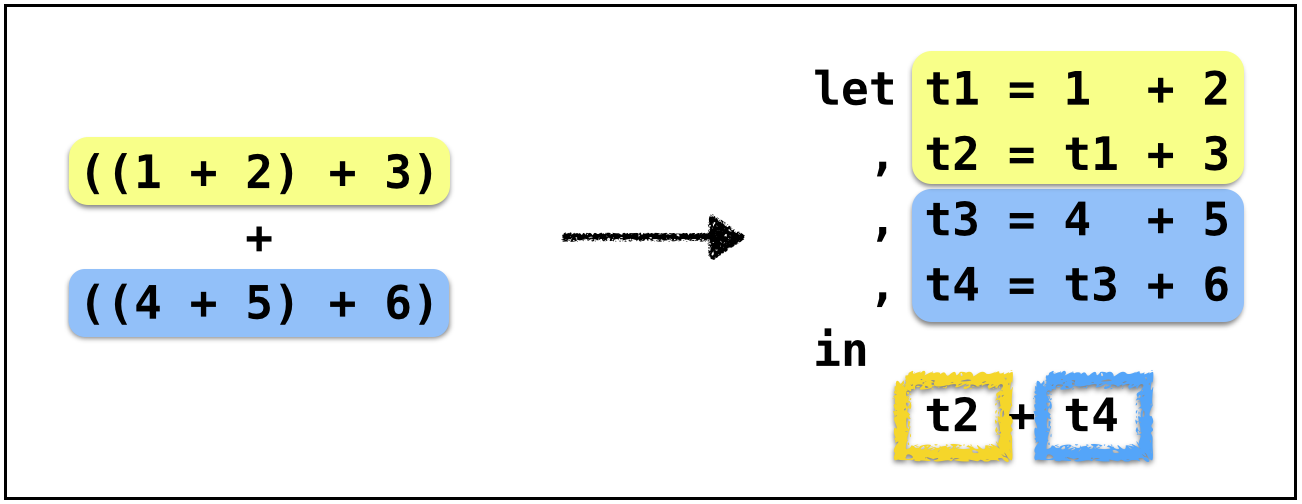
ANF: General Strategy
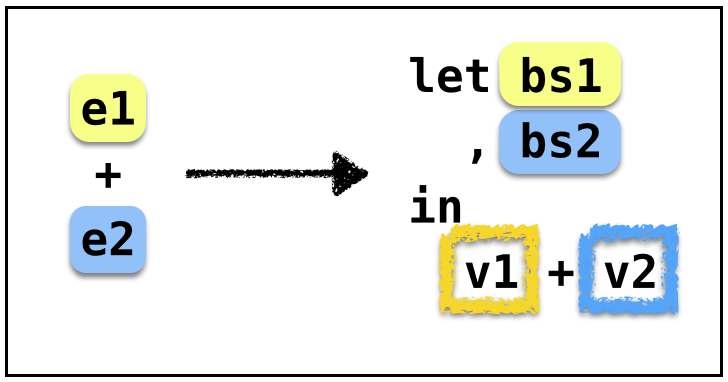
- Invoke
immon both the operands - Concat the
letbindings - Apply the binop to the immediate values
ANF: Implementation
Lets implement the above strategy
anf (Prim2 o e1 e2) = lets (b1s ++ b2s)
(Prim2 o (Var v1) (Var v2))
where
(b1s, v1) = imm e1
(b2s, v2) = imm e2
lets :: [(Id, AnfE)] -> AnfE -> AnfE
lets [] e' = e
lets ((x,e):bs) e' = Let x e (lets bs e')Intuitively, lets stitches together a bunch of definitions as follows:
For Let just make sure we recursively anf the sub-expressions.
Same principle applies to If
- use
anfto recursively transform the branches.
ANF: Making Arguments Immediate via imm
The workhorse is the function
which creates temporary variables to crunch an arbitrary Bare into an immediate value.
No need to create an variables if the expression is already immediate:
The tricky case is when the expression has a primop:
imm (Prim2 o e1 e2) = ( b1s ++ b2s ++ [(t, Prim2 o v1 v2)]
, Id t )
t = makeFreshVar ()
(b1s, v1) = imm e1
(b2s, v2) = imm e2 Oh, what shall we do when:
Lets look at an example for inspiration.

That is, simply
anfthe relevant expressions,- bind them to a fresh variable.
imm e@(If _ _ _) = immExp e
imm e@(If _ _ _) = immExp e
immExp :: AnfE -> ([(Id, AnfE)], ImmE)
immExp e = ([(t, e')], t)
where
e' = anf e
t = makeFreshVar ()One last thing: Whats up with makeFreshVar ?
Wait a minute, what is this magic FRESH ?
How can we create distinct names out of thin air?
What’s that? Global variables? Increment a counter?

We will use a counter, but will have to pass its value around
Just like
doTag
anf :: Int -> BareE -> (Int, AnfE)
anf i (Number n l) = (i, Number n l)
anf i (Id x l) = (i, Id x l)
anf i (Let x e b l) = (i'', Let x e' b' l)
where
(i', e') = anf i e
(i'', b') = anf i' b
anf i (Prim2 o e1 e2 l) = (i'', lets (b1s ++ b2s) (Prim2 o e1' e2' l))
where
(i' , b1s, e1') = imm i e1
(i'', b2s, e2') = imm i' e2
anf i (If c e1 e2 l) = (i''', lets bs (If c' e1' e2' l))
where
(i' , bs, c') = imm i c
(i'' , e1') = anf i' e1
(i''', e2') = anf i'' e2and
imm :: Int -> AnfE -> (Int, [(Id, AnfE)], ImmE)
imm i (Number n l) = (i , [], Number n l)
imm i (Var x l) = (i , [], Var x l)
imm i (Prim2 o e1 e2 l) = (i''', bs, Var v l)
where
(i' , b1s, v1) = imm i e1
(i'' , b2s, v2) = imm i' e2
(i''', v) = fresh i''
bs = b1s ++ b2s ++ [(v, Prim2 o v1 v2 l)]
imm i e@(If _ _ _ l) = immExp i e
imm i e@(Let _ _ _ l) = immExp i e
immExp :: Int -> BareE -> (Int, [(Id, AnfE)], ImmE)
immExp i e l = (i'', bs, Var v ())
where
(i' , e') = anf i e
(i'', v) = fresh i'
bs = [(v, e')]where now, the fresh function returns a new counter and a variable
Note this is super clunky. There is a really slick way to write the above code without the clutter of the i but thats too much of a digression, but feel free to look it up yourself
Recap and Summary
Just created Boa with
- Branches (
if-expressions) - Binary Operators (
+,-, etc.)
In the process of doing so, we will learned about
- Intermediate Forms
- Normalization
Specifically,
